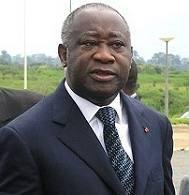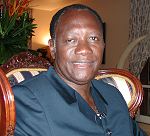 Cote D'Ivoire President Laurent Gbagbo Jan 11, 2011
Cote D'Ivoire President Laurent Gbagbo Jan 11, 2011Threats of military intervention in Cote D’Ivoire by international parties following Laurent Gbagbo's refusal to step down from the presidency are ‘pushing the country on a treacherous path to a precipice of war’, argues Mawuli Dake.
As the Economic Community of West African States (ECOWAS), France, the African Union (AU) and the United Nations (UN) continue to beat war drums over Cote D’Ivoire, they are pushing the country on a treacherous path to a precipice of war. From all indications, the actions of these international actors are based on two precarious grounds – as though the fact of Laurent Gbagbo’s despicable conduct amounts to an unconditional justification for any form intervention; and as though the most important consideration for African leaders in this crisis is sacrosanct obligation to ‘prove something to the international community’. Could we not be witnessing another historic foreign policy blunder in the making?
Two of Africa’s most respected peace-building and governance organizations – The West African Network for Peace-building (WANEP) and the Institute for Democratic Governance (IDEG) respectively, have both expressed serious reservations about the proposed military intervention in Cote D’Ivoire. I cannot agree with them more. There is no question that any attempt to use military force by any party in the impasse will mean another costly war and human tragedy for the citizens of that country and neighboring countries. It is easy to sit in Abuja, Paris or our various peaceful corners of the world and call for or applaud military invasion of Abidjan, but I wonder if that will still be the case if any of these people have a mother or a child’s life at stake. The sad reality is that it will indeed be a matter of life or death for the many Ivorian families that will be caught in the middle of this fight – as many of the countries pushing for the use of force continue to make arrangements for the evacuation of their citizens in the event of a full blown violence. But what about the millions of Ivorian families that have no one to evacuate them and nowhere to go?
The single most important geo-political foreign policy hindsight of the past decade, arguably, is the lesson not to indulge in a hasty invasion of a foreign country – without counting the cost, absolute necessity to do so; and without a clear exit strategy. It will be unfortunate to repeat the biggest error of the past decade. We can blame Gbagbo – rightly – for the unfortunate situation in his country, but international actors in the crisis must also take some responsibility for their actions that continue to contribute to a poisonous atmosphere that increasingly limits options for non-violent engagement and solutions. How did we so quickly get to a near-consensus view settling an election dispute through war?
BIG MISTEPS BY THE INTERNATIONAL ACTORS
YOU CAN BE THE IMPARTIAL MEDIATOR OR CHOSE SIDES AS AN ALIGNED ACTOR, YOU CANNOT BE BOTH: The AU, UN and ECOWAS have all openly sided with Alassane Ouattara. There is nothing wrong with choosing sides if these bodies believe it is the right thing to do. But it smacks of political naiveté and self-delusion for these institutions to still expect to be seen and treated as neutral mediators by the direct parties in the conflict. They have forfeited their unique status as the rightful arbiters. Their current disposition of alignment while at the same time pretending to be neutral, in fact makes them totally ineffective at both.
GOOD MISSIONS, WRONG EMISSARIES: The AU and ECOWAS did the right thing by dispatching envoys to Cote D’Ivoire to push for a peaceful outcome to the crisis, but appeared to have totally miscalculated in their choice of individual leaders for these missions. The AU’s choice of Kenyan Prime Minister Raila Odinga makes little political and strategic sense – as Odinga was one of the first and vocal proponents for military action against Gbagbo. An act that without question compromises his chances of having the confidence of both parties – a critical condition for a meaningful diplomacy or mediation.
ECOWAS on the other hand could not have made a worst choice. ECOWAS’ three member presidential delegation included Presidents Bai Koroma of Sierra Leone, Pedro Pires of Cape Verde and Yayi Boni of Benin. While it makes sense to choose them because they have not expressed any divisive opinions on the situation – and this is not to take anything away from these leaders, the political fact is that none of them have any political or economic clout to either persuade or compel Gbagbo in this matter. The fact that leaders of each of the ECOWAS member countries are presidents does not mean they wield the same influence.
LOUSY DIPLOMACY: There is difference between tough diplomacy and warmongering. From the get go, both the UN and ECOWAS appeared to have failed to put tough but tactful diplomacy front and center of their efforts – opting instead for approaches that are reactionary and incendiary instead strategic and thoughtful. Even to the extent that they appear be in alliance with armed rebels in their joint guarding of Ouattara's base at the Golf Hotel. Hastily threatening Gbagbo with the use of force even before attempting any genuine diplomacy and negotiations was a bad move and has not helped in any way in creating the conditions for a meaningful engagement with the outlawed regime. Sending a delegation with a message of ‘step down or face our military action’ cannot count as a serious diplomatic effort.
WHY MILITARY ACTION IS A BAD IDEA
1) Recipe for human tragedy: No one can predict exactly what will happen in the event of military action against Gbagbo’s regime. But we can be certain about one thing – there will be tragic human cost.
2) This military intervention will be unlike any other that ECOWAS forces have ever engaged in. As stated by Dr Kwesi Aning, peacekeeping analyst at the Kofi Annan International Peacekeeping Training Centre, ‘Ivory Coast is different from Liberia and Sierra Leone. It is a functioning wealthy country with a strong army, so a force will meet some credible resistance.’
3) It will require long-term commitment of troops and scarce resources – so far there is no strategy on the table that could potentially result in a swift military operation that can ensure a quick transition and stability in Cote D’Ivoire. It will be a misplaced priority to divert the region’s limited resources to sustain a long-term operation of this nature. Wars are expensive and its financial cost is likely to be the most expensive among the various options available to both local and the international actors at this point. There is no indication that the West African countries threatening war will be able or willing to commit the troops needed for such an exercise considering their own internal developments.
4) Neither the regional nor international leaders can demonstrate that they have exhausted diplomatic and non-military options at this point to warrant war.
5) But ending the current impasse will be just the first step of a long process to build once again a united Cote d’Ivoire under one national leadership to which all Ivorians without exception would be loyal.
SOME IDEAS FOR THE PATH FORWARD
– Stop the unnecessary warmongering: War, whether civil or with international forces will not be in the interest of Ivoirians and their country. All parties must thus tone down the agitation for violent confrontation.
– Devise a deliberate diplomatic and mediated strategy: ECOWAS must lead efforts by crafting a non-military strategy that utilises the vast array of diplomatic and economic tools for persuasion, negotiating and compelling Gbagbo step down. Such a strategy must also utilise the experience and influence of some influential former presidents from the region – including Jerry Rawlings, Obasanjo and John Kufuor. Ghana’s John Kufuor showed great leadership as chairman of the African Union during a similar impasse in Kenya.
– Form an International Mediation Team: WANEP recently called ‘for the creation of an International Mediation Team’ comprising the leadership of the various sub-regional and international actors. I will strongly encourage the engagement of the The Elders – as one of the few entities that can be trusted to provide independent and thoughtful guidance to the mediation process.
– Quatarra and his ‘government’ must show leadership and statesmanship, by discouraging any hasty military invasion of their country. It was unfortunate for his appointed Ambassador to the UN, Youssoufou Bamba, to allege genocide in Cote d’Ivoire – a clear insinuation for military intervention. An international invasion, may eventually defeat the headstrong Gbagbo and get them their desire to be installed as a new government, but will have irreparable long term consequences for their people. In addition, they should also be held to the same standards as Gbagbo’s men – with regards to respect for human rights and responsible conduct. He must forcefully discourage the incitement and acts of vandalism from his loyalists – including the armed rebels that are fighting on his side.
– Just as the citizens are increasingly implored to desist from using violence to express or resolve electoral grievances, I believe leaders of the region should demonstrate that same level of restraint.
– Prioritise Ivorian lives above all else and be conscious of the implications of each of the options you consider on the safety and wellbeing of the people.
Not that democracy and elections are less important, but that the lives citizens must be paramount – as all that are bound to be meaningless in war. And not that anyone desires for Gbagbo to get away with his irresponsible and selfish misconduct, but the circumstances may demand some uncomfortable compromises, not because of Gbagbo, but for the many vulnerable families who may unfairly be the victims of doing otherwise. Oftentimes, there is no perfect choice in a messy crisis – but we can always choose the lesser of two evils. And in this case, we may have to explore some difficult approaches, but around the principles of respecting of the will of the people as expressed in the run-off elections and ultimately their lives and safety.
For the sake of sparing Ivorians another costly human tragedy, our leaders must pursue solutions that will not compel Ivorian citizens to have to choose between democracy and their fundamental rights to life and safety. That we can, even in our most difficult times, find solutions- that work, without resorting to violence. That political misfits like Gbagbo will no longer be tolerated in African leadership.
BROUGHT TO YOU BY PAMBAZUKA NEWS
* Mawuli Dake is the CEO of Africa Group Consult, a premium consultancy firm committed to providing fresh strategic solutions to Africa’s challenges. He was a member of the four member ECOWAS Vision 2020 team, constituted by the president of ECOWAS in 2008 to develop the current vision of the sub-region.
* Please send comments to editor@pambazuka.org or comment online at Pambazuka News.
Let your voice be heard. Comment on this article.
Mr. Dake makes very sound arguments for putting this conflict in the proper perspective rather than for a speedy and popular resolution. Diplomatic blunders have been made and the international community should take a deep breath, step back and reassess their previous moves. The rest of Africa is watching and the outcome of this diplomatic effort will serve as precedent for future conflicts. Ghana's Atta Mills served his country's interest's well by keeping their troops out of the conflict. Leaders like Gbagbo may be pariahs but we should beware of shaving the skin off our thighs when our baby shits in our lap.
Komla Prosper Ametu



No comments:
Post a Comment